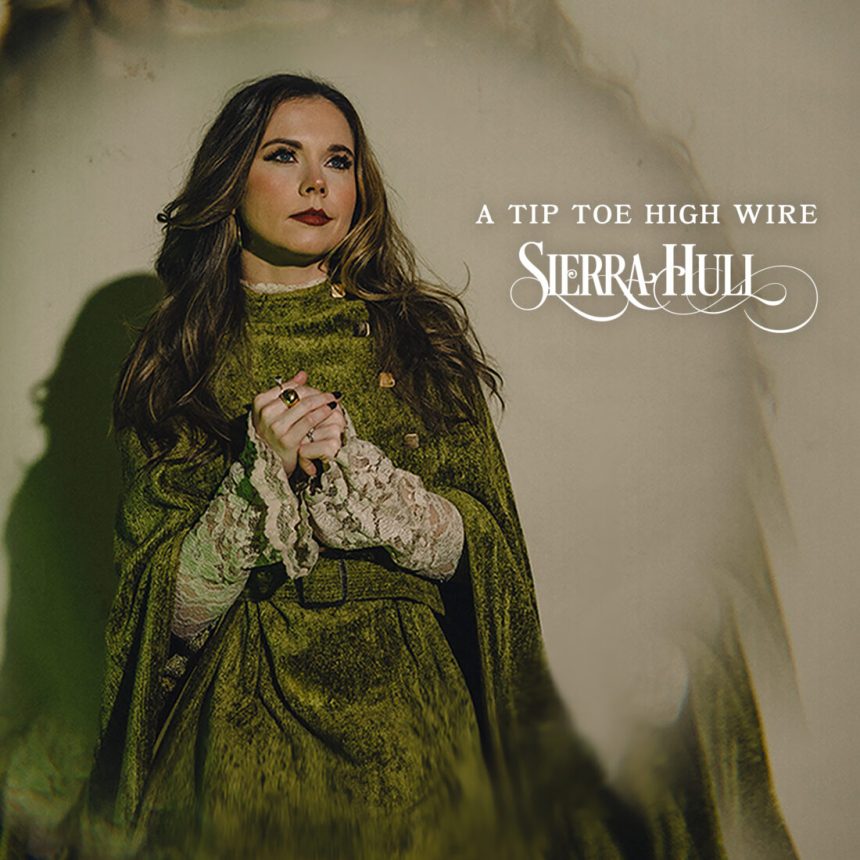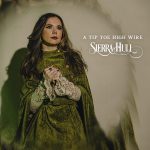No teenager relishes being told what to do. Sierra Hull was just thirteen when she signed a record deal with Rounder Records. A mandolin prodigy, the East Tennessee native soon had voices chirping in her ears about the best way to navigate her career. But as she gained confidence over the ensuing years, including recording three studio albums, playing hundreds of shows, and collaborating with bluegrass elites like Alison Krauss, Béla Fleck, and Sturgill Simpson (she moonlights as the mandolin player in Simpson’s bluegrass project, Cuttin’ Grass), Hull was eager to enter the next phase.
Out this March, Hull’s exceptional A Tip Toe High Wire marks her first album released independently, and it’s the record she seemed destined to create. She produced it herself, and the mandolin fireworks are still prominent in tracks like “Lord, That’s a Long Way” and “E Tune,” a lively instrumental with Fleck. However, she shows restraint on standouts like the funky opener, “Boom,” “Muddy Water,” and the delicate “Spitfire,” allowing the soaring melodies and introspective lyrics to take center stage.
Today, Garden & Gun is proud to premiere “Spitfire” and its accompanying video, which features the multi-talented Hull playing acoustic guitar. Watch it below, and read on for our interview with Hull about her newfound independence, her grandmother who inspired the track, and what she’s learned about songwriting over the years.
A Tip Toe High Wire is out March 7 and available for pre-order here.
You’re going it alone in your thirties; it’s an interesting spot to be in.
I have no idea what it’s like to be independent. I’m always paying attention to what people I admire are doing and trying to learn from them. Béla and Sturgill are brilliant artists, but they are also very mindful of how they conduct their careers. [Being independent] isn’t exactly what I envisioned many years ago when thinking about my career. But we live in such a different landscape now for the way music is presented to the world, and that direct connection with the fans is harder and harder to have. We’re trying to fight through algorithms, and a million songs are being released daily. This album is what I can control, and I can choose the way to give music to the people who care about what I’m doing without having to mold it to fit something else.
I listened to “Boom” a few times and wrote down the line, “You gotta open up the windows / you gotta let some sunlight in.” That seems apt.
I need to hear that myself sometimes [laughs]. I’m talking to me as much as anyone.
But it’s a different vibe than some of the album’s songs.
Yeah, but it felt really natural to kick off the record with that song. This is funny to say, but it is a more lighthearted song than I sometimes write. I like to get in the weeds and write things as angsty as they can be. I’ve always been drawn to that kind of songwriting, so it was fun to think differently about some of the songs on this record, like “Boom” or “Let’s Go,” ones that would feel joyful to stand on stage and play.
And you balance those with something like “Spitfire.”
That song is very personal and a bit more from the school of “deeper songwriting,” meaning it’s more vulnerable lyrically and a little more emotional and triggering. My family history goes back deep into the mountains here in Tennessee. People who didn’t have a whole lot were making their own soap and had no indoor plumbing. My granny grew up that way. She was married at seventeen, and her husband drowned right in front of her within the first month of their marriage—what a tragic, crazy thing to have happen in your life. I think of my granny as this give-you-the-shirt-off-her-back kind of woman, the queen of the fried pies and a huge talker, very loud and fiery in the best ways. I could have written ten more verses about her.
Do you have a routine for writing?
I wish I were one of those people who write every day. I’ve got voice memos on my phone with just a ton of stuff. So, I’m constantly logging ideas, and when I get to a moment of quiet, I can sit down and start working on things. Then maybe I’ll find a musical part that accompanies it. It’s part of why I’ve enjoyed co-writing over the last few years; it gives you a real reason to put it on the calendar and show up. Not everything you’re going to write will be great, but it allows you to bring your ideas to the table and try to follow through with them. And then also be pulled out of, you know, the rut you can get into by being inspired by other people’s ideas, too.
I think Apple’s Voice Memos app is the unsung hero of modern-day songwriting.
Oh, thank God for Voice Memos. I don’t know how people did it before, especially our kind of people who play by ear. Béla told me that he used to call his voicemail and leave a message of him playing an idea. That’s how he would remember it.
You’ve played with loads of collaborators. What have you taken from one or two of them?
Well, Béla is a highly driven musician with an amazing ability to improvise. It’s a wild experience to stand on stage with him night after night. There’s just an endless well of talent that he has to offer, and that’s incredibly exciting. In contrast, someone like Sturgill approaches music in a really laid-back way. It’s almost the opposite of Béla, whose music features complex arrangements, and we’ve rehearsed for many hours to perform it, let alone relax into it. With Sturgill, he often says, “Don’t overplay it, or you’ll lose its sparkle.”
So, where do you fit on that spectrum?
I called the album A Tip Toe High Wire because I feel like I exist in these worlds: I love [both] simple songs and progressive music that pushes the boundaries. I love the instrumental side but want to sing great songs, too. I’m juggling those things, so hopefully I won’t fall on my face.







